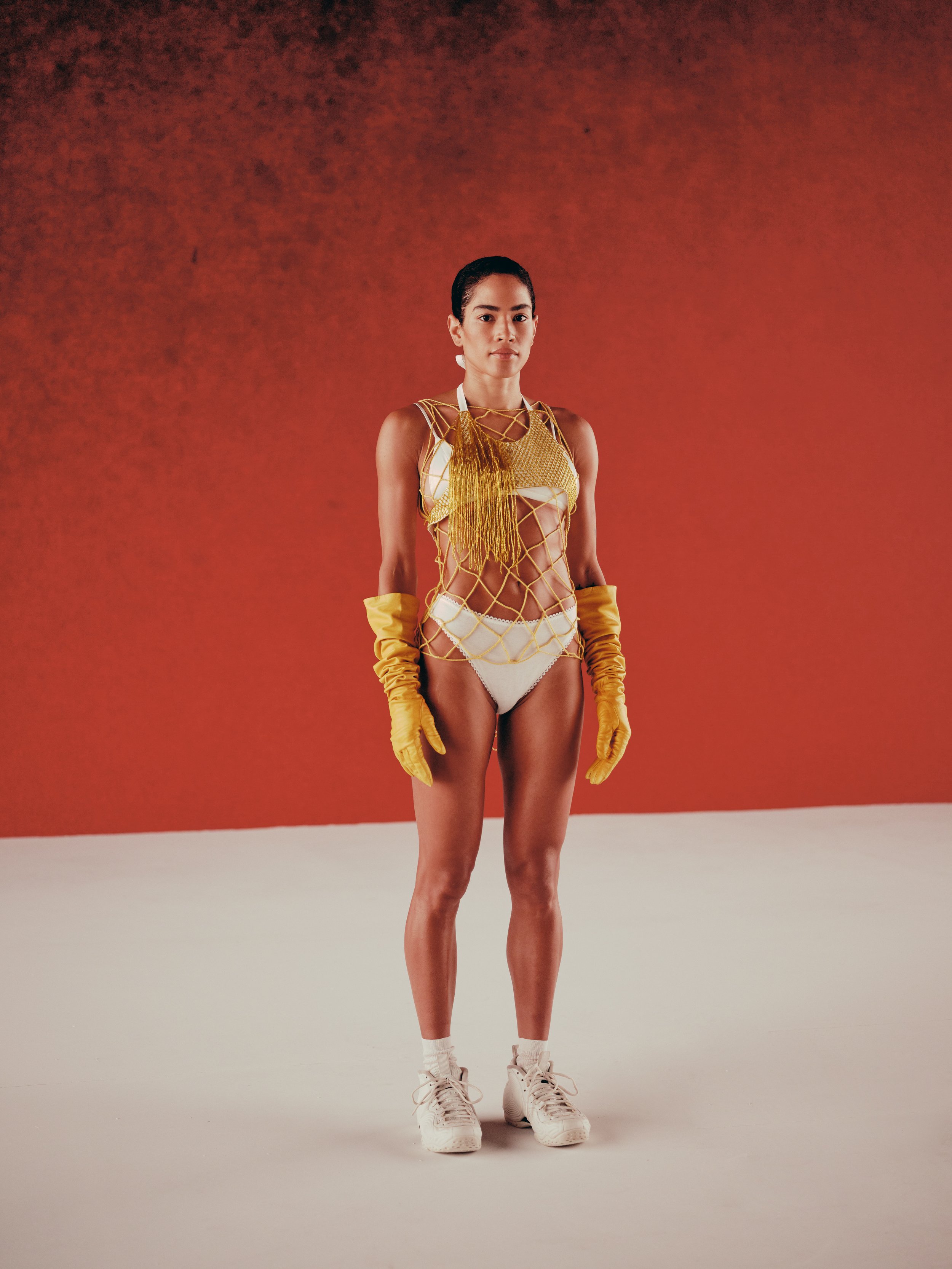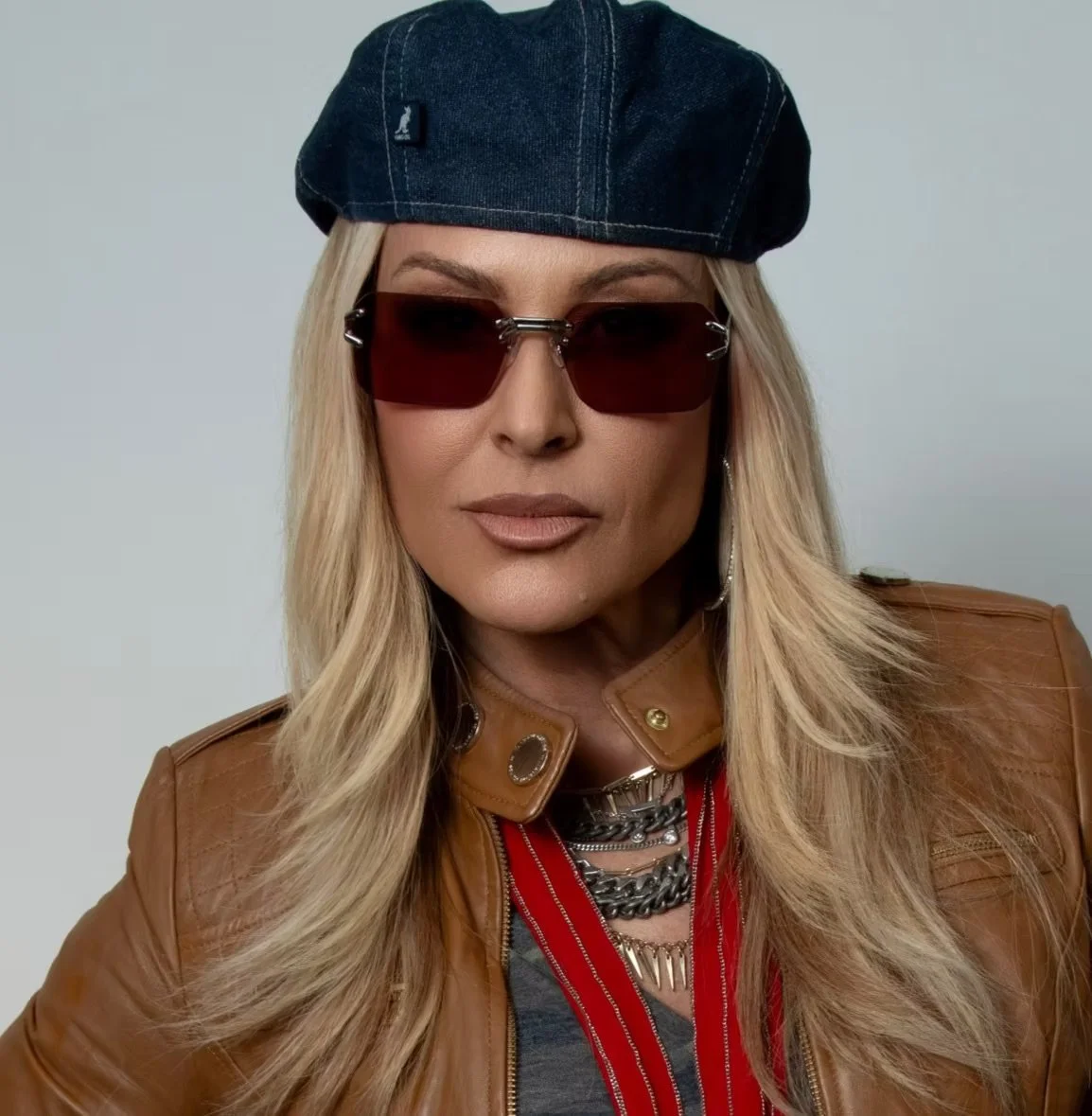At Last, METTE Takes Center Stage
Courtesy of Sony Music
METTE
At Last, METTE Takes Center Stage
By Bonnie Langedijk
Mette Towley was a force long before she starred in the video for the Rihanna and N.E.R.D song “Lemon.” The American triple threat singer, dancer and actress was a member of Pharrell’s dance group The Baes since 2014, starred in Hustlers alongside J. Lo, will be in the upcoming Barbie Movie and recently walked the runway for British luxury house Alexander Mcqueen.
Under her artist name METTE, Towley is ready to enter the music industry on her terms. After years of being cast into other performer’s narratives, she’s had the time – and experience – to develop one of her own. Determined to redefine what a female pop star is and the image of perfection that often goes with it.
Her single ‘Mama’s Eyes’ was released earlier this year, followed by a music video directed by artist and fashion photographer Camille Summers Valli. “Camille is always working at the intersection of dismantling archaic structures which we as women live under,” METTE told HURS. The partnership between the two women makes for an ideal starting point to share METTE’s message as an artist. And an opportunity for us to speak with the fearless performer.
Courtesy of Sony Music
Courtesy of Sony Music
Bonnie: You’ve worked across dance and movies and now music. What has it been like to now take center stage?
Mette: The goal for me is always autonomy and being at the helm of how I'm representing who I am and my point of view. As a dancer, I was cast in many different roles. I wore what I was told to wear, I performed and embellished the movement the way that a choreographer would tell me to. I was a part of orbiting around someone else's dream. But being an artist now, I have the autonomy to choose creatively how and when I want to speak for myself and what I want to say.
The video for your single Mama’s Eyes launched on the 3rd of May, right?
Mette: Yes, I chose a woman to direct it. Obviously Camille [Summers Valli] is incredible and I don't want any of her work or POV to lay solely on her gender. However, to be seen through the female gaze felt like such an opportunity as much of the work I've done in the past has been through a male gaze. Luckily as an actress – out of the four projects I've done – three of them have been [with] female directors. That's unheard of.
“The goal for me is always AUTONOMY and being at the helm of how I'm representing who I am and my point of view.”
Absolutely, that’s special.
Mette: Moving into this video was pretty astounding in the sense of self that I felt because I have creative control. I love to play on standard gender roles in terms of what I wear. The first scene in the video is really at an intersection of gender. I feel like I've always lived at intersections
In what way?
Mette: I’m from a small town in Minnesota. I moved there when I was young from a more suburban area around Baltimore. I grew up with a multicultural background. I grew up with a lot of different influences. I never saw myself as one-dimensional. Now being able to put that into my work is incredible for me.
Completely. It seems like there’s more opportunity to build that full universe around yourself as an artist now.
Mette: Human beings I don't think are one-dimensional in any way. It's part of our evolutionary journey to learn to accept all sides of ourselves and the influences that we have. My musical and visual influences are quite broad. I'll listen to James Taylor, Tina Turner, Robyn, I love Underworld.
We're moving away from a place where you have to fit into this one box or one genre. I don't think that works anymore.
Mette: It doesn't work. When people ask me what kind of music I make, I just have to press play and say welcome to my world.
You mentioned before about being casted for certain roles. Has it been difficult to develop your own identity as an artist and what you want to say within this new ‘role’?
Mette: My call to action right now is to stay so true to myself. Creating art is full of effort, and that's not to be taken lightly. I make a lot of mood boards and video references. I draw from these folders on my laptop that are filled with things I adore. It could be a particular video clip of a dancer at Prince's tour that moved me but it doesn't need to be a moving body or a performer. It can also be art, sculpture, a sunrise. I start to pull it into my editing app, and then I'll make these edits around the song so I can build the world based off of things that influence me. It has to come in the moments where I'm not under pressure to deliver a reference. In the quiet moments where I can sit with an idea, is where I choose how to articulate it to the world.
Going back to Camille. How did you find out about her work?
Mette: It was pretty serendipitous. It involved two Kats, one who works at the label and a friend of mine who’s a director in Paris. I had initially been speaking to my friend about the video. I told her I wanted it to be something unique, something that questions what a female pop performance is. And my friend suggested Camille, who was on the initial list Kat from the label shared. Camille and I got on the call and we instantly clicked.
And what was the starting point for creating the video?
Mette: We wanted to draw out this idea of what mothering is and how many ways we mother ourselves. How we accept mentorship and motherhood but also mothering through art making or conceiving an idea.
I love that. A couple of months ago Santigold, Lykke Li and Arlo Parks spoke out about the music industry’s grueling schedule. Have you ever felt the pressure to keep up with the pace of the industry?
Mette: The “seizing of the moment” narrative, is a real narrative. As a backup dancer, if you're one of the dancers of the moment and you're getting booked on a ton of jobs, burnout is most likely going to happen. After five years, I asked myself: What am I even saying anymore when I step on stage? I lost what I loved about dance, which was putting myself at the forefront of the politics of representation. I felt more like an accessory. I was in this hamster wheel of getting on stage, looking hot, wearing something skimpy and shaking my bum. I took time away from dance and got re-grounded in my point of view. That’s when ‘Lemon’ came along. I know how important it is to say: let me take a beat and let me reconnect. There's so much inspiration we can get when we're not working.
You can’t keep going constantly. Rest is undervalued in the society we live in.
Mette: The American dream is propped up by this constant we must do more. If we're not doing actively, pressing ourselves to the limits or truly hurtling over a boundary, then we're not doing enough. But I also really want to go on tour and have those moments of being on stage consistently and meeting fans. To be witnessed and seen in the moment in real time, unedited. That's a part of live performance that I love.
I love what you said earlier about the Lemon. I remember the video so well because it was very sexy, but in a powerful way. I had never seen someone dance like that in a music video before. Now knowing the backstory, it makes sense why the performance was so powerful.
Mette: I had a few conversations with the directors Todd Torso and Scott Cudmore about who this feminine being was in this video. I was obsessed with the fact that I got to portray this dynamic female force. I came up with this backstory about rebirth. Rihanna cutting my hair was the end of one chapter and dancing in the swap meet was the middle ground to the next chapter. I had a whole story about who this woman was. Every time I got to perform, I had something to reconnect to. Whether it be on tour or on the NBA All Star game halftime show – which was insane to do a two minute solo on those stages.
That is insane.
Mette: For me it was important not to sensationalize my body. One of my favorite dance choreographers – who is also a speaker – is Alonzo King. I watch a lot of his YouTube videos to get re-connected to lineage as a dance scholar from the University of Minnesota. He has an amazing quote where he says: “You don't want to be pretty.” So to me, pretty, sexy, that's all kind of surface level. But he says: “You want to be beautiful, you want to tell the truth.” There’s a part of us that loves performers where we can see humanity in them. Listen, I want to be sexy, don't get me wrong. That's a powerful energy to carry, but there has to be an element of essence.
That's especially important when thinking about female performance. To have that layeredness in a performance is vital.
Mette: It's difficult. I have a tuned sense of symmetry, from my years of standing in front of a mirror in dance class. I've lived through the period of this hyper perfection that I see on social media. So I have to challenge myself. In the video, you'll see moments where I look less conventionally like a female pop star. That’s intentional, but it's also something that I have to work for to deliver. It’s what’s needed and it's also what I want to show.
That also opens doors for other artists, and changes the wider narrative around perfectionism and being a multi-dimensional being.
Mette: It's important because as women, we're constantly being asked to placate these archaic ways of being through which patriarchy attempts to define us. It's important that my work as an artist is to be an ally in dismantling those ideas. Let's blow the roof off of patriarchy in a non-violent way.
Exactly.
Mette: We're constantly engaging in cultural production and as an artist that's not lost on me. I also look at my peers and some of the incredible work that they're doing. Christine and the Queens is a huge influence for me in terms of living one's truth. I saw Chris at Coachella and I just cried because of what it takes to live so unapologetically. I look up to artists who are able to deliver their vision and their sense of self to a world that is constantly pointing fingers and trying to tear down other people's authenticity. It's artists like Chris that moved me to take on certain challenges of my own and reveal a true sense of myself.
This interview has been edited and condensed for clarity.






